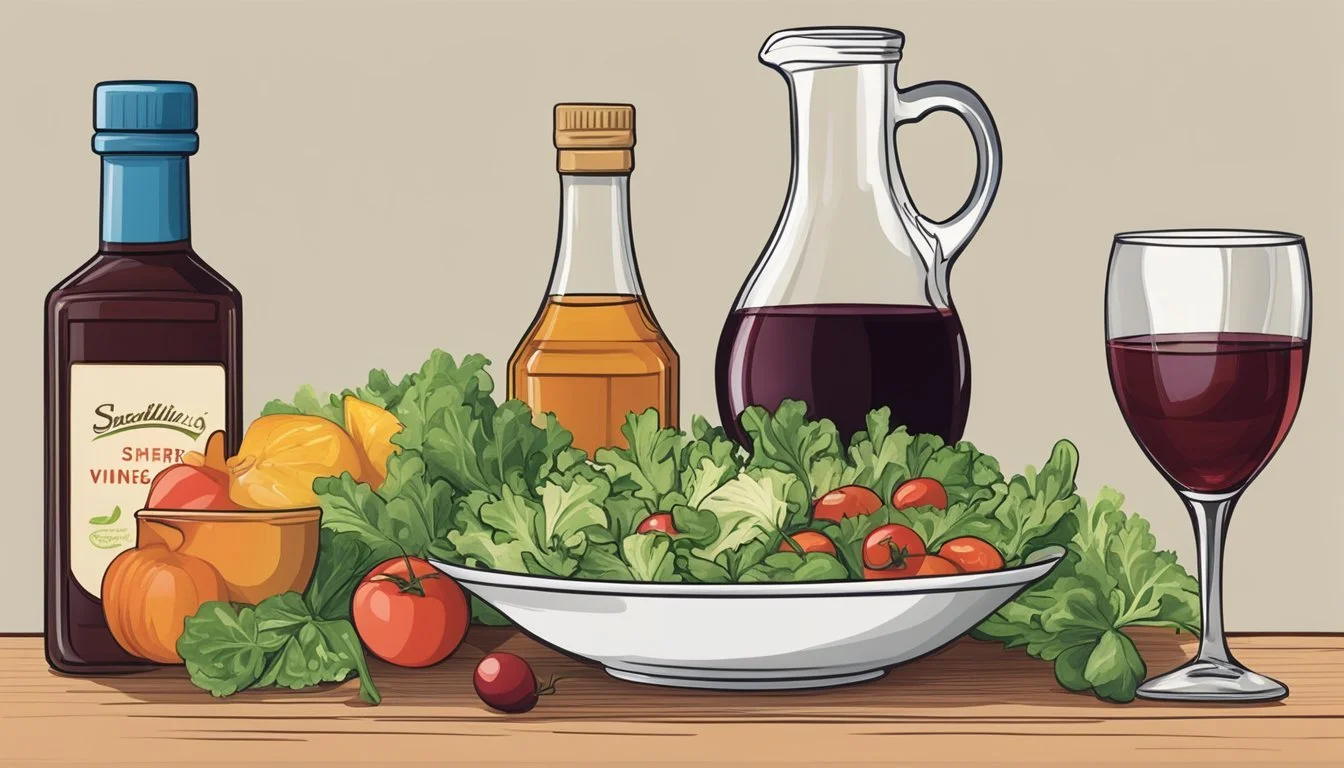How to Substitute Red Wine Vinegar for Sherry Vinegar
A Simple Swap Guide
When a recipe calls for sherry vinegar and it's not available in the pantry, red wine vinegar can be an excellent alternative. Known for its tangy flavor, red wine vinegar shares a similar flavor profile with sherry vinegar, making it a suitable substitute in many dishes. It's important to consider the acidity and flavor strength when substituting, as red wine vinegar tends to be more potent than its sherry counterpart.
In culinary applications, both sherry vinegar and red wine vinegar can enhance the taste of salad dressings, marinades, and sauces. Since sherry vinegar usually has a milder and slightly sweeter flavor, adjustments to the quantity of red wine vinegar may be necessary to achieve a balanced result. A general guideline is to use a little less red wine vinegar than the recipe indicates for sherry vinegar to avoid overpowering the dish.
The switch from sherry to red wine vinegar should be done with care, taking into account the overall flavor composition of the recipe. For instance, if a dish requires the gentle sweetness of sherry vinegar, a dash of sugar might be added alongside red wine vinegar to mimic the original taste more closely. This ensures that the culinary creation maintains the intended flavor nuances while utilizing the available ingredients effectively.
Understanding Vinegar and Its Uses
In the realm of cooking and culinary arts, vinegar is an indispensable ingredient, known for its ability to impart acidity and enhance the flavor profile of various dishes. This section provides insight into the essential nature of vinegar and how it functions within different culinary applications.
The Basics of Vinegar
Vinegar is a liquid produced through the fermentation of ethanol by acetic acid bacteria. This process turns the alcohol commonly found in wine, cider, or other fermented beverages into acetic acid, giving vinegar its characteristic sour taste. Vinegar's acidity is pivotal for its role in cooking, but its flavor can also be influenced by the original substance used for fermentation.
In terms of vinegar substitutes, it's crucial to match the vinegar's acidity and flavor profile. For example, one might replace red wine vinegar with apple cider vinegar or white wine vinegar in some recipes, especially in sauces and marinades, where the balance of flavor and acid is key.
Culinary Applications of Vinegar
Vinegar's versatility is showcased through its wide array of uses in the kitchen. Common applications include:
Sauces and Marinades: Vinegar can tenderize proteins and inject tanginess into sauces and marinades. The choice of vinegar, like red wine vinegar or sherry vinegar, can significantly influence the end result.
Vinaigrettes and Dressings: The acidity in vinegar is essential in vinaigrettes, helping to balance the flavors and emulsify oils.
Pickling: Vinegar's preservative qualities make it perfect for pickling, locking in flavors and extending the shelf life of vegetables.
For a specific substitute like sherry vinegar, which has a mellow, nutty flavor, one might choose red wine vinegar combined with a hint of sweetness to replicate sherry's unique taste, especially in vinaigrettes where sherry vinegar is traditionally used. Understanding the intended balance of acidity and flavor nuances in the original recipe is critical to a successful substitution.
Comparison of Vinegar Types
When substituting vinegars, it's important to consider both the flavor profile and acidity levels of the ingredients involved.
Sherry Vinegar Characteristics
Sherry vinegar originates from the sherry wine produced in Spain. Its profile is complex, with a balance of nutty and sweet flavors—much owed to the aging process in wooden barrels. Sherry vinegar typically embodies a milder acidity compared to red wine vinegar, making it a subtle yet distinctive component in dressings and sauces.
Red Wine Vinegar Attributes
Red wine vinegar is crafted from red wine that has undergone fermentation. This type of vinegar is known for its bold and tangy flavor with some fruitiness. Red wine vinegar’s acidity is more pronounced than that of sherry vinegar. It introduces a robust character to dishes, which can be softened with the addition of sugar to better mimic the milder sherry vinegar.
Other Vinegar Varieties
Below are brief profiles of various vinegar types which could also be considered when substituting for sherry vinegar, based on certain recipes:
White wine vinegar: This is a lighter alternative, less acidic than red wine vinegar and suitable for more delicate dishes.
Balsamic vinegar: A rich, dark vinegar with a complex flavor—sweet and earthy. Its sweetness may work in a reduction or glaze but is generally more intense than sherry vinegar.
Apple cider vinegar: With a fruity tang similar to sherry vinegar, it's a useful substitute but may impart a stronger apple flavor.
Rice vinegar: Particularly in its unseasoned form, rice vinegar is mild and slightly sweet, good in Asian-inspired dishes but less acidic than sherry vinegar.
Champagne vinegar: Fermented from champagne, it is very mild and can be used when a gentler touch is needed.
Cider vinegar: Similar to apple cider vinegar but potentially less refined in flavor.
Citrus juices: While not vinegar, the acidic nature of lemon or lime juice provides a fresh zing and can brighten up dishes similarly to vinegar when used in moderation.
Substituting Red Wine Vinegar for Sherry Vinegar
When one needs to replace sherry vinegar in a recipe, red wine vinegar often serves as a fitting substitute due to its similar flavor profile and acidity. It is important for the cook to consider how the substitution may alter the taste and to adjust the quantity appropriately for the best results.
Flavor Considerations
Sherry vinegar is known for its complex, nutty flavor with a hint of sweetness. By contrast, red wine vinegar is typically more robust and less sweet. To mimic the sherry vinegar's flavor, one may need to add a touch of sweetness by incorporating a pinch of sugar. However, even though red wine vinegar offers a different flavor, it still imparts a suitable acidity that can complement many dishes where sherry vinegar is required.
Proportion and Usage
The general guideline for substitution suggests that one can replace sherry vinegar with red wine vinegar in a 1:1 ratio. However, due to the sharper taste of red wine vinegar, starting with a slightly smaller amount and adjusting to taste is advisable. For example, if a recipe calls for 1 tablespoon of sherry vinegar, one might begin with 2 teaspoons of red wine vinegar and adjust as necessary.
Marinades: Red wine vinegar can tenderize meats much like sherry vinegar.
Salad Dressings: Its acidity is effective for emulsifying dressings.
Sauces: Can add depth and a vibrant acid note to sauces.
She should always taste their dish while preparing it to ensure the desired flavor balance is achieved when using substitutes.
Specialty Substitutes and Alternatives
When substituting red wine vinegar, one can opt for fruit-based vinegars or non-fruit vinegar alternatives that offer similar acidity with varying flavor profiles.
Fruit-Based Vinegar Alternatives
Fruit-based vinegars can add a unique twist to dishes with their distinct flavors while providing the necessary acidity.
Apple Cider Vinegar: This is a versatile vinegar with a mild fruitiness that complements the profile of red wine vinegar. It can be used in a 1:1 ratio.
Raspberry Vinegar: Offers a fruitier flavor and works well in dressings and marinades. Use in the same quantity as red wine vinegar.
Balsamic Vinegar: A much sweeter and denser vinegar, but can substitute in small amounts for a depth of flavor.
Citrus Juices: Lemon or Lime Juice can be used when acidity is more important than the vinegar flavor. They provide a fresh, zesty kick.
Non-Fruit Vinegar Substitutes
For those who prefer a substitute closer to the original vinegar taste, these non-fruit vinegars are preferable.
White Wine Vinegar: This is less robust than red wine vinegar and serves as a mild substitute. One should use it in a 1:1 ratio.
Rice Wine Vinegar: An excellent Asian cuisine staple with a milder taste. Rice wine vinegar will bring a delicate acidity to dishes.
Grape Vinegar: Not as common, but it is a good alternative due to its origin from wine grapes, similar to red wine vinegar.
Preparing Sherry Vinegar Alternatives
When a recipe calls for sherry vinegar, it's important to match its unique acidic profile while capturing its hint of sweetness. Sherry vinegar substitutes can be crafted or adjusted at home to achieve a close approximation to the original ingredient.
Home-Made Vinegar Infusions
Creating a home-made vinegar infusion involves adding flavors to a base vinegar that mimic those of sherry vinegar. White wine vinegar works well as a base due to its similarity in acidity. One can infuse it with a pinch of sugar to emulate the sweetness of sherry vinegar. Sherry wine, when it's available, can be gently diluted with water and a touch of vinegar to both decrease alcohol content and increase acidity. The resulting infusion will lack sherry vinegar's aged complexity but can approximate its nutty flavor profile.
Recipe for Sherry Vinegar Substitute:
1 tablespoon white wine vinegar
A pinch of sugar (about 1/4 teaspoon)
1/2 teaspoon sherry wine
Mix the ingredients well and allow them to sit for a few minutes before using to let flavors meld.
Adjusting Acidity and Flavor
Sherry vinegar's characteristic flavor comes from aging in wooden barrels, which imparts a depth not found in other vinegars. To adjust a substitute, taste is key. Users might need to modify the acidity of their substitute by adding small amounts of vinegar or diluting with water to suit their palate. Sweet and nutty notes can be accentuated with sugar; however, caution is advised—too much will skew the balance.
Acidity Adjustment Table:
Vinegar Type Suggested Ratio Notes Red Wine Vinegar Start with less than sherry vinegar amount Less acidic, adjust to taste Apple Cider Vinegar 1:1 Similar tenderizing quality, check flavor balance White Wine Vinegar 1:1 Add sugar to enhance sweetness
The substitute should be used immediately to ensure that the newly adjusted flavors do not dissipate over time.
Sherry Vinegar's Role in Specific Dishes
Sherry vinegar, esteemed for its nuanced flavor derived from the fermentation and aging process, holds a prestigious place in gastronomy. It plays a critical role in defining the flavor profiles of certain dishes.
Enhancing Meat Dishes
Sherry vinegar excels in marinades for meat dishes. It tenderizes the meat while imparting a complex, slightly nutty flavor that is less harsh than other vinegars. This is particularly beneficial for cuts of meat that benefit from marination, like steak or pork. Cooks might employ sherry vinegar in combination with herbs such as rosemary or tarragon to deepen the taste.
Dressings and Vinaigrettes
In the realm of dressings and vinaigrettes, sherry vinegar is a chef's ally for crafting balanced and refined flavors. Its moderate acidity and subtle sweetness harmonize with olive oil, contributing to a smooth vinaigrette that can elevate simple salads to gourmet status. The distinct flavor of sherry vinegar pairs well with robust greens and aromatic vegetables.
Soups and Gazpachos
Sherry vinegar provides a bright lift to soups and gazpachos, especially those rooted in Spanish cuisine. Its addition can enhance the soup’s palate without overpowering the core ingredients. A splash of sherry vinegar can profoundly affect the overall depth of a classic gazpacho, balancing the sweetness of ripe tomatoes and the pungency of raw garlic and onions.
Health Benefits and Nutritional Content
Both red wine vinegar and sherry vinegar offer a unique set of health benefits and nutritional content. This section will explore the caloric values and macronutrient profiles of these vinegars, as well as their roles in digestive health.
Calories and Macronutrients
Red Wine Vinegar:
Calories: Low; typically contains 3-5 calories per tablespoon
Protein: Negligible; less than 0.1 grams per tablespoon
Fat: Zero; vinegar contains no fat
Carbohydrates: Minimal; usually around 0.1 grams per tablespoon
Sherry Vinegar:
Calories: Slightly higher than red wine vinegar, but still low; about 5-10 calories per tablespoon
Protein: Minimal; similar to red wine vinegar
Fat: Not present
Carbohydrates: Slightly higher than red wine vinegar, ranging from 0.2 to 0.4 grams per tablespoon
Both vinegars are low in calories and macronutrients, making them a healthy addition to meals without significantly increasing caloric intake.
Vinegar and Digestive Health
Vinegar has been studied for its potential benefits to digestive health. Here's how red wine vinegar and sherry vinegar measure up:
Digestive Support: The acetic acid in vinegar can help with the digestion of proteins in the stomach, leading to improved digestion.
Glycemic Control: Vinegar has been shown to lower blood sugar levels when consumed with meals, making it beneficial for individuals with diabetes or those looking to manage their glycemic response.
Satiety: Some research suggests that vinegar may increase feelings of fullness, which could support weight management efforts.
While sherry vinegar contains compounds like antioxidants potentially offering additional health benefits, both it and red wine vinegar can be healthful when used in moderation as part of a balanced diet.
Storing and Handling Vinegar Substitutes
When considering substitutes for red wine vinegar such as sherry vinegar, understanding proper storage and handling is crucial to maintain their quality and flavor profiles. This ensures that the substitutes will deliver the desired effect in recipes.
Preservation and Shelf Life
Sherry Vinegar: Sherry vinegar should be stored in a cool, dark place to preserve its flavor and prevent deterioration. Ideally, one might use oak barrels for aging sherry vinegar, which can enrich the vinegar with more complex flavors. However, when storing it after opening, a tightly sealed glass container is recommended.
Fruit Vinagers (like apple cider vinegar): Fruit vinegars also should be stored in a cool, dark place. They do not benefit from aging in the same way that traditional balsamics do, and their shelf life can be considered indefinite as they are self-preserving due to their acidity.
Balsamic Vinegar: Traditional balsamic vinegar, which may be aged upwards of 12 years, is best preserved when stored away from heat and light in a tightly sealed container to prevent oxidation and evaporation, which can alter its complex flavor.
Vinegar Type Shelf Life Storage Notes Sherry Vinegar Several Years Cool, dark place; tightly sealed after opening Fruit Vinegar Indefinite Cool, dark place; airtight container Balsamic Vinegar 3-5 years; improves with age Away from heat and light; well-sealed
Safe Vinegar Handling Practices
Handling vinegar of any kind requires a few safety precautions. Vinegar should be kept away from children and pets as its acidic nature can be harmful if ingested in large quantities or if it comes into contact with eyes.
Cleaning Spills: Quickly address any spills to prevent damage to surfaces or accidental slips. For sticky vinegar like balsamic, warm water and soap are effective for clean-up.
Avoid Contamination: Always use clean utensils when measuring or pouring vinegar to maintain its purity and prevent the introduction of bacteria. This is particularly pertinent for fruit vinegars which have a sweeter profile and can attract more bacterial growth if contaminated.
In summary, proper storage in a cool, dark environment and careful handling can substantially extend the life of vinegar substitutes and ensure they remain safe and effective for culinary uses.
Frequently Asked Questions
In this section, readers will find specific information regarding the substitution of red wine vinegar for sherry vinegar, including ratios, tips, and a comparison of flavor profiles between sherry vinegar and other common vinegars.
Substitution Ratios and Tips
When substituting red wine vinegar for sherry vinegar, the recommended ratio is a 1:1 ratio. This means that if a recipe calls for one tablespoon of sherry vinegar, one should use one tablespoon of red wine vinegar instead. However, as red wine vinegar can be tangier and more acidic, it may be wise to start with a slightly smaller amount and adjust to taste. For a more nuanced flavor, one might consider adding a touch of sweetness to mimic sherry vinegar's milder taste.
Start with less: Begin with slightly less red wine vinegar than the recipe calls for sherry vinegar.
Adjust to taste: Taste and add more vinegar as needed, keeping the flavor balance in mind.
Sherry Vinegar vs. Other Vinegars
Sherry vinegar has a complex, nutty flavor profile that is less harsh than many other vinegars. Its flavor is also milder and slightly sweeter compared to red wine vinegar, which displays a robust and tangy taste. Other alternatives to sherry vinegar include:
White Wine Vinegar: Less acidic, more mild, suitable as a substitute, though may need to be used in a lower quantity.
Champagne Vinegar: A sweeter, less harsh vinegar that can be substituted, especially for recipes that require a gentle vinegar presence.
Fruit Vinegars: Such as raspberry vinegar, which can replace red wine vinegar in a 1:1 ratio but note its fruitier flavor.
When choosing a sherry vinegar substitute based on alcohol content, one should note that any non-distilled vinegar will retain traces of alcohol from fermentation. However, the amount is minimal and mostly cooks off during the cooking process.







